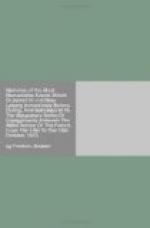with his new army, and, proceeding from Stoetteritz,
to turn his enemies on the right flank, and, as he
had often done before, to attack and annihilate them.
I was however egregiously mistaken. The emperor
went with his retinue scarcely a thousand paces, to
the first houses of the Kohlgaerten, where he took
up his quarters, and quietly passed the night.
The guards and the whole train likewise stopped in
that neighbourhood, and there bivouacked. It
grew dark. The palisades at the gate had left
but a narrow passage, through which troops and artillery
kept pouring without intermission. People on
horseback and on foot, who wanted to return into the
city, had been already detained for several successive
hours; the crowd every moment increased, and with
it the danger. To seek another entrance was impracticable,
as a person would run the risk of being detained by
the thousands of pickets, and shot, or at least dragged
to the filthiest bivouacs. The night was dark
as pitch, and no hope left of getting home. It
rained fast, and not a corner was to be found where
you might take shelter. I was in the midst of
more than a thousand horses, which threatened every
moment to trample me under their feet. Fortunately
for me, they were all tolerably quiet The thunder
of the artillery had long ceased; but, had it even
continued, it could not possibly have been heard amidst
the rattling of carriages and cannon; the shouts of
soldiers and officers, as sometimes cavalry, at others
infantry, wanted to pass first; the incessant cursing,
cracking, pushing, and thrusting. Never while
I live shall I witness such a scene of confusion, of
which indeed it is impossible to convey any conception.
It continued without intermission from four in the
afternoon till twelve at night, so that you may figure
to yourself the disagreeable situation in which I was
placed. No sooner had the first columns arrived
at their bivouacs in the neighbouring villages, than
a thousand messengers came to announce the intelligence
in a way that sufficiently proved what unwelcome visitors
they were. Weeping mothers with beds packed up
in baskets, leading two or three stark-naked children
by the hand, and with perhaps another infant at their
back; fathers seeking their wives and families; children,
who had lost their parents in the crowd trucks with
sick persons forcing their way among the thousands
of horses; cries of misery and despair in every quarter:—such
were the heralds that most feelingly proclaimed the
presence of the warriors who have been celebrated in
so many regions, and whose imposing appearance has
been so often admired, all these unfortunates crowded
into the filthy corner formed by the old hospital
and the wall at the Kohlgaerten-gate. Their cries
and lamentations were intermingled with the moans
and groans of the wounded who were going to the hospitals,
and who earnestly solicited bread and relief.
A number of French soldiers, probably such as had loitered
in the rear, searched every basket and every pocket




